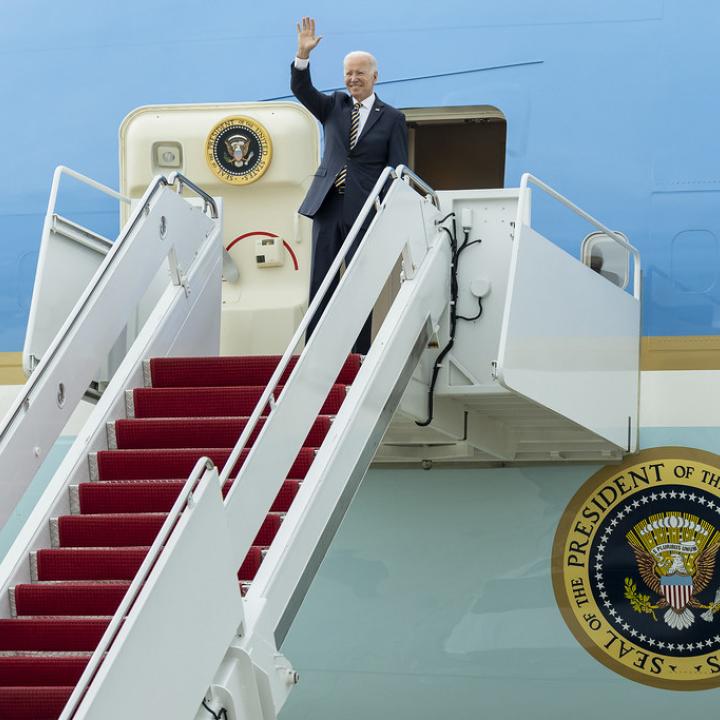
- Policy Analysis
- Policy Alert
Biden Heads to Egypt Amid Economic Protests and Libyan Gridlock

Although climate issues will by definition headline the latest COP summit, Egypt’s human rights record, simmering protest movement, and questionable policies in neighboring Libya will provide plenty of additional fodder for Biden’s discussions with Sisi.
On November 11, President Biden arrives in Sharm al-Sheikh, Egypt, to participate in the COP27 climate change conference. This year’s meeting coincides with rising temperatures in Cairo, in more ways than one. Biden is slated to meet with President Abdul Fattah al-Sisi on the same day as planned nationwide protests over the country’s faltering economy. Meanwhile, Egypt’s most prominent political prisoner, Alaa Abd el-Fattah, is months into a hunger strike and is now refusing liquids, raising the prospect he might die during the conference.
During their previous meeting on the sidelines of a Saudi summit this July, Biden and Sisi issued a statement expressing “mutual commitment to a constructive dialogue on human rights.” Yet while administration spokespeople have advocated for Fattah’s release, it is not clear how much Biden will press the matter with Sisi at COP27—after all, U.S. climate envoy John Kerry openly embraced a widely criticized and sanctioned dictator (Venezuelan president Nicolas Maduro) soon after the conference opened. Even British prime minister Rishi Sunak did not publicly mention Fattah during his time at the conference, nor did he seem to make any private progress on the prisoner’s release, despite the fact that Fattah is a dual Egyptian-British national.
Biden and Sisi will also presumably discuss the country’s economic unrest, which has grown in recent weeks as currency devaluation erased nearly 25 percent of the pound’s value and inflation surpassed 16 percent, compromising the standard of living for many citizens. These developments led Cairo to once again turn to the IMF, this time for an additional $3 billion loan. Egypt has already received $12 billion from the fund since 2016, making it the world’s largest IMF debtor after Argentina. Sisi has simultaneously refused to cut spending, instead implementing mega-projects and expanding the military’s role in the economy. The new IMF loan is premised on reversing that approach and incentivizing private-sector growth.
Yet the protests will unfold well before such decisions are made, and it is difficult to predict how large they will be. The state-sponsored Dar al-Ifta religious institution has warned against potential “sedition” at the demonstrations, and government media sites have suggested that the gatherings may be driven by the banned Muslim Brotherhood organization, setting the predicate for potential violent repression of presumably peaceful protests.
On the foreign policy front, Biden should raise the topic of Libya, where Cairo is not playing a particularly helpful role. According to one UN study, having a stable Libya next door could add $100 billion to Egypt’s economy, decrease its unemployment rate by 9 percent, and increase investment by 6 percent within four years. Instead, Cairo remains stubbornly at odds with much of the international community’s approach to Libya. Egypt is the only country to recognize the parallel eastern-based government appointed by Libya’s so-called House of Representatives (HOR), even though the status of the Tripoli-based Government of National Unity is unchanged according to UN Security Council resolutions that lay out the country’s transitional path. While the United States and its other partners continue to press for elections that could bring long-needed legitimacy to a Libyan government, Egypt is still blocking this progress and supporting eastern actors such as Field Marshall Khalifa Haftar and HOR chief Aguila Saleh Issa. Cairo believes it can control them, but these actors have little interest in facilitating elections that could endanger their current privileges (or, in Haftar’s case, dictatorial ambitions). President Biden should therefore press Sisi to support a united Libya, emphasizing how it can benefit Egypt’s increasingly fragile economy.
Stabilizing Libya could also help bolster global energy security. After a months-long boycott led by Haftar, the country is once again producing close to 1.2 million barrels of oil per day. Properly maintaining the sector’s fragile infrastructure and increasing downstream investment could substantially increase Libya’s production in the near future.
Four months after Biden’s previous trip to the Middle East, the Sharm visit is an opportunity to press U.S. interests on human rights in Egypt, stability in North Africa, and increased oil production. All of these topics will be a hard sell for Cairo—but given that Sisi is somewhat on the defensive domestically, he may be marginally more receptive to Biden’s overtures, at least on the economic front. One thing is certain: if Biden takes the same approach he used in their last meeting and simply praises Sisi for restraining Hamas in Gaza, he will miss an important and potentially short-lived opportunity to wield U.S. leverage.
David Schenker is the Taube Senior Fellow at The Washington Institute, director of its Program on Arab Politics, and former assistant secretary for Near Eastern affairs at the State Department. Ben Fishman is a senior fellow at the Institute and former director for North Africa on the National Security Council.


